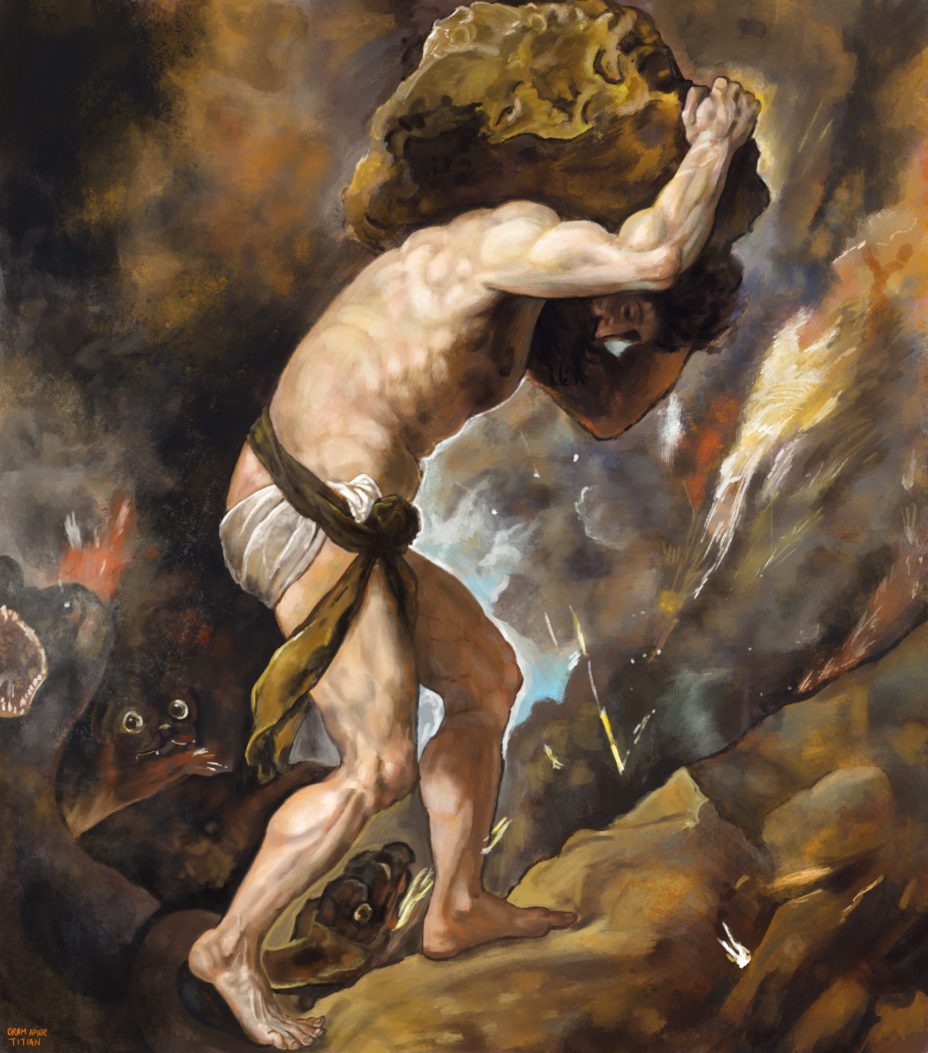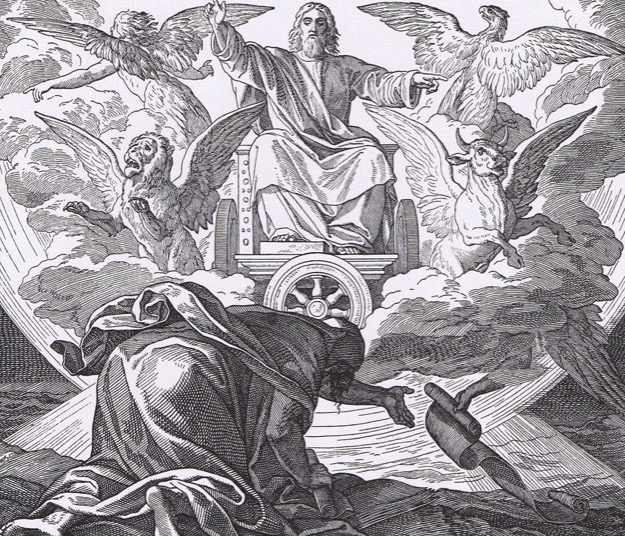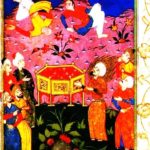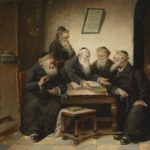Most of the rest of Surah 74 consists of Allah’s curses on unbelievers, especially a particular unbeliever. I think this may be evidence of the first confrontation of Abu Lahab. Conventionally, this was assigned to Surah 111, but in the ahadith, Surah 111 must only happen after three years and after Surah 26, so it’s still far too early to put it in. But if there’s a tradition that Abu Lahab was cursed early on, this would be it.
I’m not going to divide the entire surah into individual revelations because it is a continuous thought. I’ll take it in bigger sections with only a blank line separating where I think the individual revelations started and stopped.
Section 1: Introduction and Cursing Abu Lahab
- And do not give favor [in order to] increase
- And for your Lord then be patient.
- Then when the trumpet is blown,
- That Day will be a hard Day
- For the disbelievers, not easy.
- Leave Me and whom I created alone,
- And I appointed him extensive wealth
- And children with him.
- And I spread out ease for him.
- Then he desires that I should add more!
- Nay! Indeed, he has been obstinate to Our Signs.
- I will burden him with a hard ascent.
- Indeed, he thought and plotted
- So is he destroyed, how he plotted!
- Then is he destroyed, how he plotted!
- Then he looked.
- Then he frowned and scowled.
- Then he turned back and waxed proud.
- Then he said, “This is naught but spells transmitted (of old).”
- “This is naught but the word of a human being.”
- I will burn him in Saqar!
- And what will make you know what Saqar is?
- It does not spare, and it does not leave (alone),
- Scorching the human.
- Over it are nineteen.
This section begins with urging believers to be charitable and not giving money in hopes of getting favors, honor, or profit, combined with a threat of coming judgement on the final Day.
Next comes a description of the current wealth of the person who is rejecting Muhammad. He is rich. He has children, including at least one son, which Muhammad doesn’t have. Yet he is stingy–he doesn’t want to give from his bounty without a return. So then the punishment: he is to have a hard ascent, or a hard climb. This is glossed in Mohsin Khan’s translation as a literal “slippery mountain in the Hell-fire called AsSa’ud.” This parallels the Greek story of Sisyphus and has no parallel in either Jewish or Christian scriptures. In this myth, a king of Corinth was punished for his greed and deceitfulness by being cursed to eternally roll or carry a heavy boulder up a hill in Hades (the Greek underworld). Whenever he would stop for a moment to take a rest, it would roll back to the bottom again. This is the only possible source for the slippery mountain in hell.
Next, we find out what the transgressor did. He told Muhammad that his ayat or “signs” were just magical spells (as Arabs understood poetic forms) transmitted from other people from a long time ago–that is, religious tales of the ancients. And he said that their arrangement was nothing more than the product of Muhammad’s own mind. At the end is a different take on the punishment: Burning in Saqar, which is understood to be a proper name for Hell. However, it only occurs in one other surah, and it seemed to confuse Muhammad’s listeners, because next, Allah is obligated to explain it.
The explanation isn’t entirely satisfactory, because later another ayat will be reveal that does away with all poetic pretense, dumping a paragraph into the middle of the lyrical prose. But that will not be until far later, when Allah is revealed to be deterministic and the free will of mankind in the previous verses must be abrogated.
Section 2: Rewards for the Believers
- Nay! By the moon
- And the night when it withdraws,
- And by the morning when it shines,
- Indeed, it is surely one of the greatest,
- A warning to human beings,
- To whoever of you wills to advance or lag behind.
- Every being will hostage for what it has earned,
- Except the Companions of the Right.
- In the Gardens, they will ask
- About the sinners,
- “What led you to Saqar?”
- They said, “We were not of those who prayed,
- Nor did we used to feed the poor,
- And we used to talk vainly with vain talkers,
- And we used to deny the Day of the Code,
- Until the inevitable came to us.
- Then intercession of the intercessors will not benefit them.
- Then what (is happening) with them, that they turn away from the reminder,
- As if they were shying donkeys,
- Fleeing from a lion!
- Rather, every one of them desires that he may be given Scripture, spread out.
- Nay! Rather they do not fear the Hereafter.
- Nay! Indeed, it is a reminder.
- So whoever willed remembered it.
Allah beings by committing shirk again, swearing moon, the night, and the morning.
This uses some of the favorite themes and words of the early revelations: the Day, the Gardens, Hell by its peculiar name, Companions of the Right, charity, reminders, warnings, and the Code (or Deen)–the first mention of this, which is the term for the code of conduct and belief of Muslims. We also have another sin listed: vain talk, which has something of the sense of gossip and also sniping. And we find out that a specific good charitable work is the feeding of the poor.
Those who have gone to Hell will be beyond hope, so Allah scornfully asks why they turn away while they still have a chance at redemption. He seems to also scorn their imputed desire that each of his detractors get their own revelation, spread out or rolled out. As it was originally revealed, mankind was perfectly able to answer the demands of Allah. However, at some point, that would change with the two additions.
Section 4: Late Additions
- And we have not made (anyone) companions of the Fire except Angels. And we have not made their number except as a trial for those who disbelieve–that those who were given the Book may be made certain and those who believe may increase in faith, and that those who were given the Book and the believers may not doubt, and that those (with) disease in their hearts and the disbelievers may say, “What does Allah intend by this example?” Thus Allah leads stray whom he wills, and he guides whom he wills. And none knows the hosts of your Lord except him. And it is naught but a reminder to human beings.
- And none will remember except that Allah wills. He is akin to fear and akin to forgiveness.
The first paragraph plops awkwardly into the flow, a blistering diatribe against people who still didn’t find Saqar all that convincing or the “nineteen” over it.
The angels are described unambiguously of companions of the Fire, which should mean, on the basis of all other use of the word “companion,” that they are sentenced to burn, too, but the Islamic sources seem to really not like using the same name for fallen and obedient angels, so this is usually taken to mean that they’re just guardians over the fire. This is eisegesis. The long statement about people of the Book here is relevant, though, because it teaches that the Jewish and Christian scriptures should find something in the word “Saqar” and the nineteen angels very convincing as evidence of the authenticity of Muhammad. However, I haven’t the foggiest idea what the source of these things are. They certainly aren’t in Jewish or Christian scriptures, nor can I find any other reference for them. If it still exists, it’s probably a Manichean, Zoroastrian, or Mandaean source.
The last two sentences of the paragraph seem like an addendum even to the addition, which would be dated late, when Allah had been revealed to not be calling everyone to him but rather to be determining who should be saved and who thrown in the Fire though being led astray.
The second addition was probably done at the same time as the addendum–when the free will of man had been almost entirely extinguished from Muhammad’s dosctrine.





